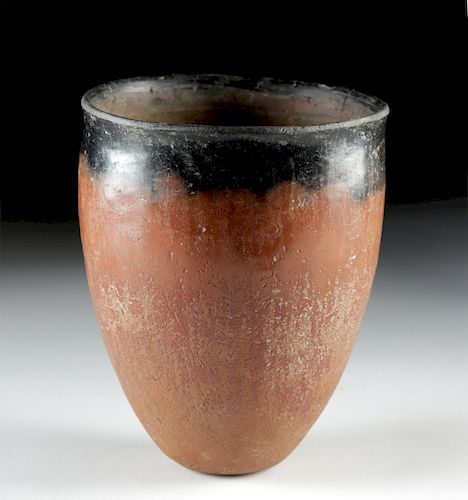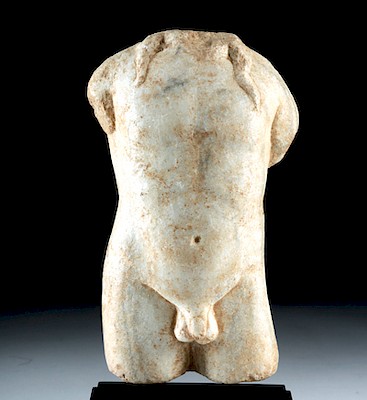Very Fine Egyptian Pre-Dynastic Naqada Blacktop Vase
Lot 1
About Seller
Artemis Fine Arts
686 S Taylor Ave, Ste 106
Louisville, CO 80027
United States
Selling antiquities, ancient and ethnographic art online since 1993, Artemis Gallery specializes in Classical Antiquities (Egyptian, Greek, Roman, Near Eastern), Asian, Pre-Columbian, African / Tribal / Oceanographic art. Our extensive inventory includes pottery, stone, metal, wood, glass and textil...Read more
Estimate:
$2,000 - $3,000
Absentee vs Live bid
Two ways to bid:
- Leave a max absentee bid and the platform will bid on your behalf up to your maximum bid during the live auction.
- Bid live during the auction and your bids will be submitted real-time to the auctioneer.
Bid Increments
| Price | Bid Increment |
|---|---|
| $0 | $25 |
| $300 | $50 |
| $1,000 | $100 |
| $2,000 | $250 |
| $5,000 | $500 |
| $10,000 | $1,000 |
| $20,000 | $2,500 |
| $50,000 | $5,000 |
| $100,000 | $10,000 |
| $200,000 | $20,000 |
About Auction
By Artemis Fine Arts
Dec 5, 2018
Set Reminder
2018-12-05 10:00:00
2018-12-05 10:00:00
America/New_York
Bidsquare
Bidsquare : DAY 1 | Classical Antiquities & Asian Art
https://www.bidsquare.com/auctions/artemis-gallery/day-1-classical-antiquities-asian-art-3698
Day 1 of an important 2-day auction featuring ancient and ethnographic art from around the world. Egyptian, Greek, Roman, Viking, Near Eastern plus Asian Art from China, Japan, Thailand, Vietnam, Burma, India, more. Artemis Fine Arts info@artemisgallery.com
Day 1 of an important 2-day auction featuring ancient and ethnographic art from around the world. Egyptian, Greek, Roman, Viking, Near Eastern plus Asian Art from China, Japan, Thailand, Vietnam, Burma, India, more. Artemis Fine Arts info@artemisgallery.com
- Lot Description
Ancient Egypt, Pre-Dynastic period, late Naqada I to early Naqada II, ca. 3600 to 3300 BCE. A gorgeous coil-formed Nile silt pottery vessel with a highly-burnished, russet-hued surface made with a thin iron-oxide slip. The vase has an ovoid body which rests gently upon a round yet stable foot, with a deep interior cavity and a rolled rim. The upper black-hued portion is comprised of thick carbon deposits formed by administering the top to thick clouds of smoke for extended periods of time in an oxygen-deprived environment. Black-top vessels originally rose to popularity during the early Naqada I, a culture which inhabited ancient Egypt during its pre-dynastic period. The Naqada were first described by famed archaeologist William Flinders Petrie, however relatively little is known about them except that they were focused around the site of El-Amra in central Egypt, west of the Nile River. Size: 4.75" W x 5.7" H (12.1 cm x 14.5 cm)
Pre-Dynastic Egyptian black-top vessels were traditionally made from silt deposits taken from the Nile river due to their abundance in iron and silica. After the pot had dried but before it was fired, it would first be burnished and rubbed smooth with a small stone to create the pinstripe vertical striations still visible today. An iron-rich slip would then be applied just before firing; when placed in an oxygen-rich environment, the elevated temperatures would create the vessels’ signature red-orange hue.
After the end of the Naqada III period around 3,000 BCE, the use of Nile silt in pottery creations fell out of favor with the Pre-Dynastic Egyptians. This is due to the increase in popularity of marl clay, a newly-discovered material for creating terracotta objects which was easier to shape and enabled firing at far greater temperatures than the highly-porous silt.
For a similar example of Naqada II black-top pottery, please see the Metropolitan Museum of Art, accession number 36.1.4: https://www.metmuseum.org/art/collection/search/547291
Provenance: private East Coast, USA collection
All items legal to buy/sell under U.S. Statute covering cultural patrimony Code 2600, CHAPTER 14, and are guaranteed to be as described or your money back.
A Certificate of Authenticity will accompany all winning bids.
We ship worldwide and handle all shipping in-house for your convenience.
#141811Two unrepaired hairline cracks on the rim. Small chips from surface and wear to pigment commensurate with age.Condition
- Shipping Info
-
All shipping is handled in-house for your convenience. Your invoice from Artemis Gallery will include shipping calculation instructions. If in doubt, please inquire BEFORE bidding for estimated shipping costs for individual items.
-
- Buyer's Premium



 EUR
EUR CAD
CAD AUD
AUD GBP
GBP MXN
MXN HKD
HKD CNY
CNY MYR
MYR SEK
SEK SGD
SGD CHF
CHF THB
THB
















